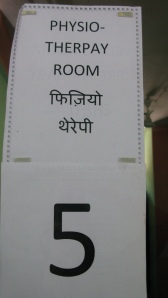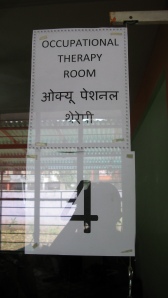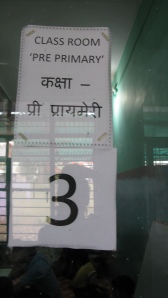 For the last few weeks I have been spending most of my time working at the Chingari Trust and Rehabilitation Center. The Chingari Trust was started in 2004 when two incredible women, Rashida Bee and Champadevi Shukla, were recognized for their activism on behalf of the thousands of survivors of the Union Carbide Gas Disaster and won the Goldman Environmental Award.
For the last few weeks I have been spending most of my time working at the Chingari Trust and Rehabilitation Center. The Chingari Trust was started in 2004 when two incredible women, Rashida Bee and Champadevi Shukla, were recognized for their activism on behalf of the thousands of survivors of the Union Carbide Gas Disaster and won the Goldman Environmental Award.
The women used the money from the award and started the Trust that has several main functions: extending economic and livelihood support programs to gas-affected women and their families, taking up initiatives that help protect and support the rights of victims of the Gas Disaster, particularly women and children, and to promote the Chingari Award, which recognizes women activists in other parts of India who are fighting against corporate crime and environmental destruction.
One of the major functions of the Chingari Trust is the work committed towards supporting the families of the many children in Bhopal born today with various mental and physical disabilities.
These disabilities are a result of the Union Carbide poisons that have been passed down to them (as third generation survivors) by their parent’s bloodstreams—as the MIC gas leaked from the factory in December 1984 never neutralized in people’s bodies and is continuing to affect people to this day. Similarly, their disabilities are due to the contamination of their only water sources by the toxins and chemicals that are still present in the abandoned Union Carbide factory. Each year the monsoon washes these chemicals (including mercury and lead) into the ground, leaching into the aquifers and boreholes that feed local water pumps.
It’s been great working for Rashida Bee and Champadevi every day because these two inspirational women were the central subjects of the original research paper that I wrote for McGill University back in 2007, and I have also been giving presentations about them and their activism over the last three years while working at Vanier College.
 Rashida Bee and Champadevi Shukla
Rashida Bee and Champadevi Shukla
I also mentioned in a previous post that I’m working with someone named Tabish. Tabish is 23 years old and lives in Bhopal. His official role is “Public Relations Officer” however he takes on several other important responsibilities at Chingari and his work is integral to the overall organization. Together, Tabish and I have been working on revising the Chingari website, and I’ve been putting my Vanier acquired grant writing skills to use by creating a database of foundations that we can apply for funding grants for and creating basic outlines for writing grant proposals.
For years, the Chingari Trust was operating a rehabilitation and special education center out of a very small building in Bhopal, with an office, and only a couple other rooms which would be packed each day with mothers and their children, in the hopes of receiving therapy and counseling for themselves and their children. Presently there are about 130 children registered with the Chingari and about 60 to 70 kids come each day. Most children come with their mothers but there are a few kids who come on their own. Chingari has three vans and their drivers drive out to the bastis (slums) every morning to pick them up and bring them to the center.
Just recently the Chingari Trust was able to move into the ground floor of much larger building on a main road in one of Bhopal’s gas affected neighborhoods. The new location has several rooms: an office, a small kitchen (where they make lots of yummy chai), a physiotherapy room, an occupational therapy room, a speech therapy room, and a special education room. Additionally, they have a long corridor where the children can play sports.
It’s a really wonderful place to be. The children, although suffering from a myriad of different disabilities and conditions, are really in their element. They are supported, stimulated, and encouraged—all of this makes them happy and leaves them feeling “normal”, an experience they do not often encounter at home and in their neighborhoods. Almost all of these children come from families that are impoverished and one can only imagine how much poverty compounds their existing health problems. This is why the free care and therapy that is given at the Chingari Rehabilitation center is so crucial.
The staff at Chingari are incredibly warm and are very skilled doctors and therapists who every day take on the challenging task of working with these children. Not only do they work with the children, but they also counsel and instruct their mothers on how to best care for and stimulate their children when they are back home.
When I’m not spending my time in the office, I’ve been sitting in the different therapy rooms, talking with the doctors and learning about their work and the progress of many of the children who visit.
Physiotherapy
 In this room, Dr. Sanjay a physiotherapist works with several different children a day. When many of these kids began coming to Chingari Trust they were unable to stand or even sit up on their own. The room has some equipment in it such as a treadmill, small weights, etc. The floors are padded, making it easier for them to walk and more comfortable for them to sit and do their exercises on the floor. The physiotherapists do muscular exercise with them and many of the mothers are around the entire time. They are taught the exercises so that they can continue the therapy at home.
In this room, Dr. Sanjay a physiotherapist works with several different children a day. When many of these kids began coming to Chingari Trust they were unable to stand or even sit up on their own. The room has some equipment in it such as a treadmill, small weights, etc. The floors are padded, making it easier for them to walk and more comfortable for them to sit and do their exercises on the floor. The physiotherapists do muscular exercise with them and many of the mothers are around the entire time. They are taught the exercises so that they can continue the therapy at home.
 Dr. Sanjay doing muscular exercises
Dr. Sanjay doing muscular exercises
One of my best buddies here is a charming little guy named Shyam Babu. He’s about seven years old and has been coming to Chingari consistently for about two and a half years. When he was first registered here, he could not sit or stand on his own. Now, not only is Shyam Babu extremely mobile–walking and running around with hardly any difficulty–but he is among the few Chingari kids who comes here on his own every day, independently.
 Shyam Babu- Turning on the charm
Shyam Babu- Turning on the charm
If everyone greeted me the way Shyam Babu does everyday, I’d feel like the most popular girl in the world!
Occupational Therapy
 Poonam, the occupational therapist explained to me that this particular type of therapy involves work that helps the kids to lead independent lives. And at a base minimum, the intention is to help them become able to make their needs known.
Poonam, the occupational therapist explained to me that this particular type of therapy involves work that helps the kids to lead independent lives. And at a base minimum, the intention is to help them become able to make their needs known.
The children who receive this type of therapy are ones who experience problems associated with sensory integration deficiencies which affects their gross and fine motor development. For example, learning how much pressure to apply when picking up a ball or a spoon. They lack in joint sensibilities and many of these children are either over-sensitive or under-sensitive. A lot of the children in this space are autistic.
Often when they arrive, they won’t be able to make eye contact with others and they will not allow people to touch them. For example, when Chaia, aged five, first arrived at Chingari she was unable to stand, walk, talk or run. Now she has all of these skills. She can respond to basic commands and is able to engage with people through eye contact. She can dress herself, feed herself and this has made life at home much easier for her parents.
 Poonam and Chaia, balancing on a ball
Poonam and Chaia, balancing on a ball
But as Poonam reminded me, for Chaia’s progress to improve even more, her therapy has to be consistent–and this requires a lot from her parents. Not only do they have to stay committed to bringing Chaia to Chingari every day, but they have to continue the exercises she is taught at home constantly.
Special Education
 Tarique, who is a national trainer in special education, was really eager to tell me all about the children who he works with in this space. First, he introduced to Pradeep, who is hearing impaired. In addition to his low hearing, he has significant short term memory loss. At seven years old he has a vocabulary of only about 15 words.
Tarique, who is a national trainer in special education, was really eager to tell me all about the children who he works with in this space. First, he introduced to Pradeep, who is hearing impaired. In addition to his low hearing, he has significant short term memory loss. At seven years old he has a vocabulary of only about 15 words.
When Pradeep first came to Chingari no one had ever heard his voice. The special education therapist works with his mother, encouraging her to learn the list of words that Pradeep has learned, and to repeat them again and again so he can try and memorize them.
Another child, Kashish has muscular dystrophy—she is currently learning to write. Her disabilities are mainly physical but her speech is highly functional. Tarique works with her on writing, counting, indentification of shapes, daily life skills, holding things like pens, cups etc. They anticipate that Kashish will be at Chingari for about three to four years before she will be ready to attend a normal school.
Poonam is 12 years old and suffers from muscular dystrophy and cerebral palsy, she also sees the physiotherapist. Poonam attended a normal school until the age of six when Chingari helped her get to a hospital for an assessment where she was eventually diagnosed with her conditions. Since she began visiting Chingari she has made much more progress than she would have at a regular school.
Then there’s adorable Menakshi Dhod—although she looks about twoshe is actually almost eight. Mentally she is extremely sharp but when she first began visiting the Chingari Trust she could hardly walk and was unresponsive to others. Menakshi is one of my best buddies at Chingari and is incredibly charming and engaging.
Speech Therapy
 Speech therapists Shanu and Dr. Kapil work here to help hearing impaired children learn their words and improve their speech.
Speech therapists Shanu and Dr. Kapil work here to help hearing impaired children learn their words and improve their speech.
 Shanu doing speech exercises
Shanu doing speech exercises
Pradeep was in this room as well, doing repetitions of words in order to help expand his vocabulary and improve his memory. Dr. Kapil had him standing in front of the mirror, repeating the words “Mobile” and “Chabis” (keys) again and again and again. Even though I heard Pradeep repeat the word “Chabis” about 40 times, after becoming briefly distracted, he immediately forgot the word. It’s very challenging work for both the children and the therapists.
Saturday Community Meetings
On Saturdays, the Chingari fieldworkers go out to designated neighborhoods, and they inquire about children (and adults) residing in the area who have physical or mental disabilities. They organize a community meeting and invite people to attend and bring their children. I accompanied the doctors in one of the Chingari vans to Jahangir Aabad, a contaminated water-affected neighborhood.
 Me and Dr. Kapil
Me and Dr. Kapil
What struck me was how far we drove away from the abandoned Union Carbide factory, and still were in a community that drinks water that has been contaminated with their poisons. Meaning that the toxins and chemicals leaching from the factory have pervaded so much of the surrounding areas that even communities located quite far away from the factory are affected by the contamination. This is why many Bhopalis call the ongoing groundwater contamination “the second disaster”.
The intention of the meeting is to inform the community members about the services that Chingari Trust can provide their children if they register and bring them each day. Some children might be too old to access the services of Chingari, and in those cases, the staff informs the parents of government services or schemes they can access for assistance or support. In many cases, the parents are unable to understand or complete the documentation necessary to access these services, and Chingari helps them with this process as well.
Additionally, the doctors and therapists of Chingari examine the children, many of them might not have seen any doctors throughout their lives, and their families have not received any outside counseling or assistance in caring for a disabled child.
I’m really enjoying my time here and I’m looking forward to the next few weeks and to what Tabish and I can accomplish together. I’m getting a lot of work done and I will continue supporting Chingari however I can once I’ve left Bhopal. Seeing the kids every day makes me really happy, and it’s a very positive “women-centered” atmosphere. Also, the ladies from the kitchen always make sure that my chai cup is never empty!
Melanie Hadida




